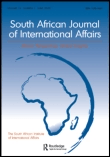
South African Journal of International Affairs-SAJIA
Scope & Guideline
Elevating African Voices in International Studies
Introduction
Aims and Scopes
- International Relations and Geopolitics:
The journal focuses on the evolving international relations landscape, particularly how African nations interact with global powers and regional organizations, reflecting on themes such as diplomacy, security, and economic partnerships. - Conflict Resolution and Peace Studies:
SAJIA addresses issues of conflict resolution, peacebuilding, and the effectiveness of various peace processes across Africa, emphasizing adaptive strategies in response to ongoing violence and instability. - Migration and Mobility:
The journal explores migration trends within Africa, examining the socio-political implications of migration, as well as the challenges and opportunities associated with human movement across borders. - Sustainable Development and Environmental Justice:
A significant focus is placed on sustainable development initiatives, climate change, and environmental justice, particularly in the context of Africa's unique challenges and the quest for equitable resource management. - Democracy and Governance:
SAJIA critically analyzes democratic processes, electoral management, and governance issues in Africa, highlighting the impact of democratic backsliding and strategies for enhancing electoral integrity. - Economic Development and Trade Relations:
The journal investigates economic policies, trade agreements, and the implications of global economic trends for African countries, particularly in relation to regional cooperation frameworks like AfCFTA.
Trending and Emerging
- Geopolitical Shifts and Emerging Powers:
There is a growing focus on the influence of emerging powers like China and Russia in Africa, examining their strategies and implications for African sovereignty and international relations. - Digital Diplomacy and Technology in International Relations:
The exploration of digital diplomacy has gained traction, with research emphasizing how technology reshapes diplomatic practices and communication in the context of African states. - Climate Change and Environmental Policy:
The urgency of addressing climate change has led to an increased emphasis on environmental policies and their intersection with international relations, particularly in relation to sustainable development goals. - Human Rights and Governance:
An emerging theme is the critical analysis of human rights issues within international relations, focusing on the responsibilities of African states and the influence of international norms. - Transnational Security Threats:
There is a rising interest in transnational security threats, such as terrorism and organized crime, and their implications for regional stability and governance in Africa.
Declining or Waning
- Cold War Dynamics and Historical Analyses:
The exploration of historical geopolitical dynamics from the Cold War era has seen a decline, as contemporary issues increasingly dominate the discourse, particularly those that address current geopolitical tensions. - Traditional Security Studies:
There appears to be a waning emphasis on conventional security studies that focus solely on military aspects, with a shift towards understanding security through broader socio-economic and political lenses. - Bilateral Relations with Traditional Powers:
Research focusing on bilateral relations with traditional powers (e.g., Western nations) has diminished, as scholars increasingly turn their attention to multipolarity and the role of emerging powers like China and India. - State-Centric Views on Development:
There is a noticeable decline in the state-centric approach to development, with more scholars advocating for inclusive and participatory frameworks that consider non-state actors and grassroots movements. - Aid Dependency and Critiques of International Aid:
The examination of aid dependency as a critical issue has receded, likely due to a growing focus on self-sufficiency and sustainable development practices that prioritize local agency.
Similar Journals
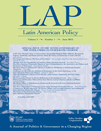
Latin American Policy
Shaping Informed Discourse on Latin American AffairsLatin American Policy, published by WILEY, is a pivotal journal in the field of political science and international relations, focusing on contemporary issues pertinent to Latin America. With an ISSN of 2041-7365 and an E-ISSN of 2041-7373, this journal serves as a key resource for researchers, professionals, and students who seek to understand the complex dynamics shaping the region's policies and governance. Since its inception in 2010, it has maintained a solid academic reputation, currently holding a Q3 ranking in both Political Science and International Relations and Sociology and Political Science categories as of 2023. Although the journal does not provide open access options, it remains a vital platform for disseminating high-quality research that drives informed policy-making and deepens scholarly discourse. The journal's focus on diverse themes ranging from socio-political transformations to international relations positions it as an essential tool for those engaged in the study of Latin America, fostering a comprehensive understanding of regional challenges and developments.

WASHINGTON QUARTERLY
Elevating academic dialogue in Social Sciences and beyond.WASHINGTON QUARTERLY, published by Routledge Journals, Taylor & Francis Ltd, is a premier academic journal that has established itself as a vital resource in the fields of Law, Political Science, and International Relations. With a rigorous publication history since 1978 and a convergence slated to continue until 2024, this journal enjoys a commendable reputation, reflected in its Q1 and Q2 rankings across multiple categories as reported in 2023. It holds impressive positions within the Scopus rankings, boasting a percentile of 85th in Social Sciences - Law and 76th in Political Science and International Relations. The journal aims to foster a deeper understanding of global political landscapes and legal frameworks while providing insightful analyses and discussions that resonate with researchers, professionals, and students alike. Although it is not currently available as an Open Access publication, the contributions published within its pages continue to influence academic discourse and policy-making worldwide. Located in the United Kingdom, WASHINGTON QUARTERLY remains committed to advancing scholarship and knowledge in its dynamic fields.
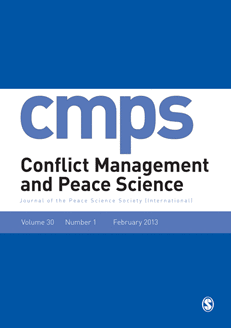
CONFLICT MANAGEMENT AND PEACE SCIENCE
Advancing scholarship for a peaceful world.CONFLICT MANAGEMENT AND PEACE SCIENCE is a highly regarded peer-reviewed journal published by SAGE Publications Inc, dedicated to advancing the academic discourse in the fields of conflict resolution, peace studies, economics, and political science. Since its establishment in 1973, the journal has provided a platform for innovative research and critical analysis of the social, economic, and political dimensions of conflict and peace, making it essential reading for researchers, professionals, and students alike. With an impressive impact factor reflecting its rigorous standards of scholarship, it is currently ranked Q2 in Economics and Econometrics and Q1 in Political Science and International Relations as of 2023, placing it among the top journals in its field. Additionally, it boasts an 85th percentile ranking for Political Science in Scopus, underscoring its influence and relevance in the academic community. The journal encourages submissions that contribute to theoretical developments and empirical studies, aiming to shed light on the complexities of conflict management and the pursuit of peace. For those interested in impactful research, CONFLICT MANAGEMENT AND PEACE SCIENCE provides an invaluable resource that fosters understanding and innovation in addressing global conflicts.

Romanian Journal of European Affairs
Fostering innovative research in political science and international relations.Romanian Journal of European Affairs is an esteemed open-access academic journal published by the EUROPEAN INST ROMANIA, dedicated to advancing research in the fields of political science and international relations. Established in 2001, the journal has positioned itself at the forefront of European studies, encompassing a diverse range of topics pertinent to the evolution of European policies and their global implications. With an impact factor substantiated by its Q3 ranking in the 2023 category of Political Science and International Relations, the journal stands at a pivotal intersection for researchers, practitioners, and students alike. Its Scopus ranking reflects a growing presence in the scholarly community, making it an essential platform for disseminating innovative research and fostering academic discourse. Based in Bucharest, Romania, the journal not only caters to local scholars but also engages a global audience interested in the dynamic interplay between European affairs and international contexts. By facilitating open access to its content, the Romanian Journal of European Affairs strives to enhance the visibility and impact of research, contributing significantly to the academic dialogue surrounding European integration and policy development.

Asia Europe Journal
Exploring the Nexus of Asia and Europe.Asia Europe Journal, published by Springer Heidelberg, serves as a vital platform for scholarly discourse at the intersection of Asian and European studies. With an ISSN of 1610-2932 and an E-ISSN of 1612-1031, this journal has made significant contributions to fields including business management and social sciences, achieving a notable Q2 ranking in both categories as of 2023. With engaging research that explores the complexities and interconnections between these two dynamic regions, the journal aims to foster a greater understanding of cross-cultural phenomena and global trends. Researchers and academics will find value in its robust editorial framework and rigorous peer-review process, making it a reputable source for innovative ideas and empirical studies. As a key resource for navigating contemporary challenges and opportunities in Asia and Europe, the Asia Europe Journal is an essential read for anyone invested in the evolving landscape of international relations and comparative social studies.

European Review of International Studies
Pioneering Research for a Complex Global LandscapeEuropean Review of International Studies is a premier journal published by BRILL, dedicated to advancing scholarship in the fields of Political Science and International Relations. With an ISSN of 2196-6923 and E-ISSN 2196-7415, it serves as a significant platform for rigorous academic discourse and contemporary research, currently holding a prestigious Q2 ranking in both Political Science and Social Sciences categories. The journal's scope encompasses a broad range of topics related to international studies, making it a vital resource for researchers, practitioners, and students alike who seek to deepen their understanding of global issues. Published from the Netherlands, the journal has been in circulation since 2014, contributing to scholarly dialogue through a worldwide readership and is indexed in prominent databases such as Scopus, where it ranks in the 41st-42nd percentile across its fields. By promoting open access to knowledge, the European Review of International Studies aims to enrich the academic community's exploration of pivotal global phenomena.
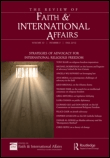
Review of Faith & International Affairs
Exploring the Nexus of Belief and PoliticsThe Review of Faith & International Affairs, published by Routledge Journals, Taylor & Francis Ltd, stands at the intersection of religion, politics, and international relations, providing a critical platform for scholarly discourse. With the ISSN 1557-0274 and E-ISSN 1931-7743, this esteemed journal has been pivotal since its inception in 2009, exploring how faith influences global affairs and fosters understanding across cultures and political contexts. Currently holding a Q1 ranking in Religious Studies and a Q2 in Sociology and Political Science, it boasts an impressive Scopus rank of #42 out of 644 in its field, reflecting its significant impact in academia, evidenced by a >93rd percentile ranking. The journal operates without open access, ensuring a curated selection of high-quality research articles that seek to enhance the dialogue between faith and policy in contemporary societies. Researchers, professionals, and students alike will find the Review of Faith & International Affairs an invaluable resource for understanding the complexities of faith in the global arena, contributing to both theoretical and practical advancements in the fields of religious studies and international relations.
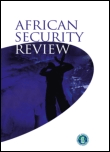
African Security Review
Navigating Africa's Security Terrain with ExpertiseAfrican Security Review is a leading journal dedicated to the critical examination of security issues affecting the African continent. Published by Routledge Journals, Taylor & Francis Ltd, and based in the United Kingdom, this peer-reviewed journal aims to foster multidisciplinary dialogue in the fields of Law, Political Science, International Relations, and Safety Research. With a commendable Q2 ranking in these areas for 2023, it sits among the top echelon of academic publications, reflecting its impact and relevance in addressing contemporary security challenges from 1995 through its ongoing contributions up to 2024. The journal provides essential insights and analyses for researchers, practitioners, and policymakers, allowing access to the latest developments and frameworks in African security. The absence of an Open Access option underscores its commitment to maintaining high academic standards and rigor in the studies it publishes. By engaging with the African Security Review, stakeholders can deepen their understanding and enhance their efforts to promote peace and stability across Africa.

Conflict Studies Quarterly
Bridging theory and practice in conflict studies.Conflict Studies Quarterly is an esteemed open-access journal dedicated to the in-depth exploration of conflict research, covering critical themes such as peace studies, conflict resolution, and socio-political dynamics. Published by ACCENT PUBLISHER since 2012, this journal emphasizes fostering interdisciplinary dialogue among researchers, policymakers, and practitioners in the field of conflict studies. With its commitment to accessibility and the dissemination of scholarly work, Conflict Studies Quarterly plays a pivotal role in advancing knowledge and understanding of conflict related issues globally. The journal provides a vital platform for sharing rigorous research and innovative perspectives, making it a valuable resource for professionals, academics, and students keen on addressing complex global challenges.

MGIMO Review of International Relations
Pioneering Insights into Global Dynamics.MGIMO Review of International Relations is a leading academic journal published by MGIMO UNIV PRESS, based in the Russian Federation. This open access journal, which has been accessible since 2012, serves as a crucial platform for the dissemination of scholarly research within the fields of international relations, political science, sociology, and history. With an impact factor that reflects its growing relevance — particularly in Q1 for History and ranked among the top tiers in related disciplines — the journal plays a significant role in advancing the understanding of complex global issues. Its wide-ranging scope encompasses critical analyses and interdisciplinary studies that appeal to researchers, professionals, and students alike. The journal’s Scopus rankings highlight its international standing, notably its 68th percentile in Arts and Humanities, underscoring its contribution to the knowledge of contemporary global relations. As it converges through the years 2019 to 2024, MGIMO Review of International Relations continues to cultivate an intellectual community that fosters impactful dialogue on international dynamics.